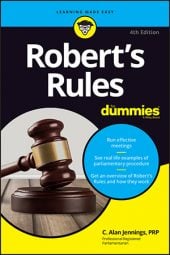No other office is more important to the smooth functioning of your group. The work of the secretary is absolutely essential, and it takes a special person to do it correctly and do it well — not because the work is difficult, but because it’s so important. Dependability, organization, and the ability to refrain from editorializing are the key attributes of a successful secretary.
Under Robert’s Rules, a secretary’s job description includes the following duties:- Take minutes at all meetings and submit them for approval to the membership at the following meeting. Minutes are the record of the proceedings in your meetings and become official when approved. If your meeting is more than a quarterly time interval away, or the term of some or all the members are expiring, you should appoint a committee to approve the minutes. (This is to ensure you have approved minutes as soon as possible. Any problems can be corrected later when your next regular meeting occurs.)
- Serve as custodian of your organization’s records (except records specifically assigned to other officers), including minutes; reports of officers, boards, and committees; and official correspondence. The secretary also certifies copies of these documents, when necessary.
- Make sure the official bylaws, special rules of order, standing rules, and current minutes book are available for reference at all meetings.
- Make the organization’s records available to members, in accordance with your rules.
- Keep the official membership roll. Sometimes this duty is specifically assigned to the treasurer or a staff member because the roll is often updated frequently based on dues payments or lapses.
- Ensure that officers, committee members, and delegates are notified when elected or appointed, and are given credentials and any necessary papers.
- Issue the notice (or call) of meetings, and serve as a correspondence secretary unless a separate position is established for that function.
- Prepare the order of business for the presiding officer, showing everything known to be up for consideration at the meeting.
- Preside over the election of a temporary chairman for a meeting if the president and vice president are absent.
If you’re the secretary, don’t wear yourself out trying to write (into the minutes) everything everybody says in meetings. In fact, it’s actually improper to do that. It boils down to this: Minutes are the record of what is done in the meeting, not what is said.
The secretary’s duty includes the duty to make available to members, at reasonable times, the records of the organization. But the members’ right to inspect the records doesn’t include the right to abuse or annoy the secretary. Whether you’re the secretary or the member wanting to see the records, a sincere respect for each other’s time and effort benefits all concerned.

